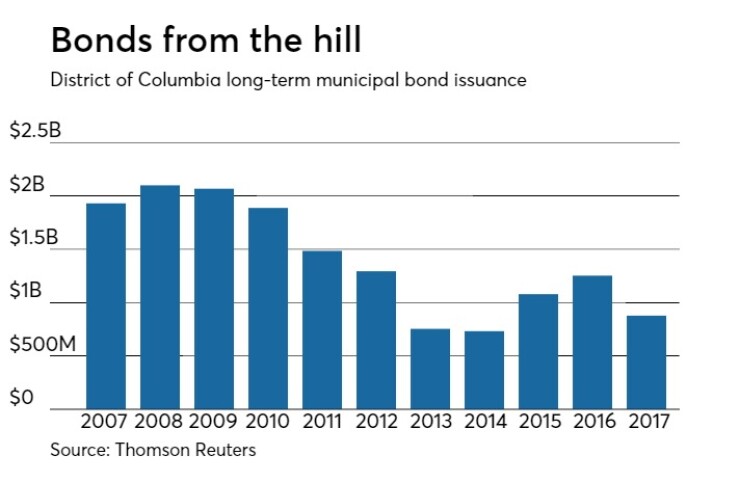Municipal bonds were substantially stronger along with Treasuries at mid-session as stock swooned on growing political unrest in Washington, D.C.
Meanwhile, the District of Columbia hit the primary market with over $500 million of general obligation refunding bonds.
Secondary market
Top-shelf municipal bonds strengthened with Treasuries on worries about the political problems the Trump Administration is having in Washington.
The yield on the 10-year benchmark muni general obligation fell three to five basis points from 2.09% on Tuesday, while the 30-year GO yield dropped four to six basis points from 2.96%, according to a morning read of Municipal Market Data's triple-A scale.
The yield on the two-year Treasury fell to 1.25% from 1.29% on Tuesday, while the 10-year Treasury yield dropped to 2.24% from 2.33%, and the yield on the 30-year Treasury bond decreased to 2.92% from 2.99%.
The Dow Jones Industrial Average fell 1.20% while the S&P 500 Index declined 1.12% and the NASDAQ dropped 1.64%.
On Tuesday, the 10-year muni to Treasury ratio was calculated at 89.9%, compared with 90.2% on Monday, while the 30-year muni to Treasury ratio stood at 99.0%, versus 99.1%, according to MMD.
MSRB: Previous session's activity
The Municipal Securities Rulemaking Board reported 44,812 trades on Tuesday on volume of $9.60 billion.
Primary market
Siebert Cisneros Shank priced the
The issue was priced to yield from 1.01% with a 3% coupon in 2019 to 3.09% with a 5% coupon and 3.39% with a 4% coupon in a split 2037 maturity.
The deal is rated Aa1 by Moody’s Investors Service and AA by S&P Global Ratings and Fitch Ratings. Moody’s and Fitch maintain a stable outlook on the credit while S&P has a positive outlook on the bonds.
Since 2007, the nation’s Capitol has sold roughly $15.76 billion of securities, with the most issuance occurring in 2008 when it sold $2.09 billion. Washington, D.C., has sold bonds every year for the past decade, only issuing less than $1 billion in a year twice during that span, with the lowest being $732 million in 2014.

Citigroup priced the Tennessee Housing Development Agency’s $175 million of residential finance program bonds for retail investors.
The $23.11 million of Issue 2017-21 bonds subject to the alternative minimum tax were not priced for retail.
The $151.89 million of Issue 2017-2A non-AMT bonds were priced at par to yield from 1.10% and 1.15% in a split 2019 maturity to 3.15% in 2030, and to yield 3.40% in 2032 and 3.70% in 2036. The split 2018 maturities were offered as sealed bids while the 2042 maturity was not priced for retail.
The deal is rated Aa1 by Moody’s and AA-plus by S&P.
RBC Capital Markets priced the North Carolina Housing Finance Agency’s $255.56 million of homeownership revenue refunding bonds.
The $17.73 million of Series 38-A bonds subject to the alternative minimum tax were priced at par to yield from 1.20% and 1.30% in a split 2018 maturity to 2% in 2022.
The $237.84 million of Series 38-B non-AMT bonds were priced at par to yield from 1.75% and 1.85% in a split 2022 maturity to 2.95% in 2028. A 2032 maturity was priced at par to yield 3.40%, a 2037 maturity was priced at par to yield 3.85%, a 2041 maturity was priced at par to yield 3.95% and a 2047 planned amortization class 2047 maturity was priced as 4s to yield about 2.15% with an average life of five years.
The deal is rated Aa2 by Moody’s and AA by S&P.
In the competitive arena, the Tulsa Public Facilities Authority, Okla., sold $115.3 million of Series 2017 capital improvement revenue bonds.
Mesirow Financial won the deal with a true interest cost of 2.64%. Pricing information was not immediately available.
The deal is rated AA-minus by S&P.
Bond Buyer 30-day visible supply
The Bond Buyer's 30-day visible supply calendar decreased $484.4 million to $14.04 billion on Wednesday. The total is comprised of $3.95 billion of competitive sales and $10.09 billion of negotiated deals.





